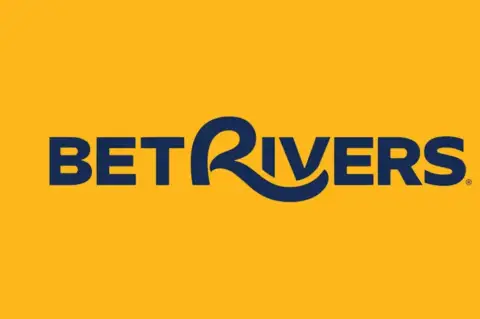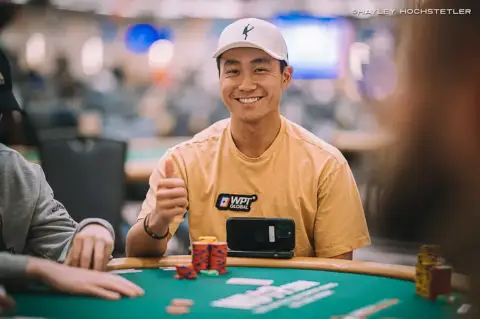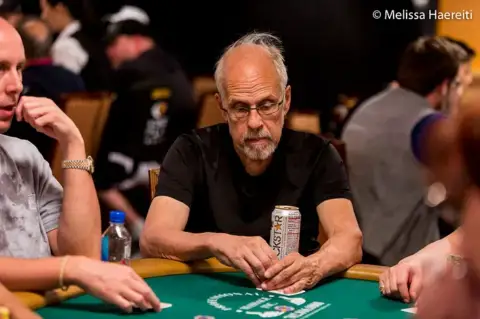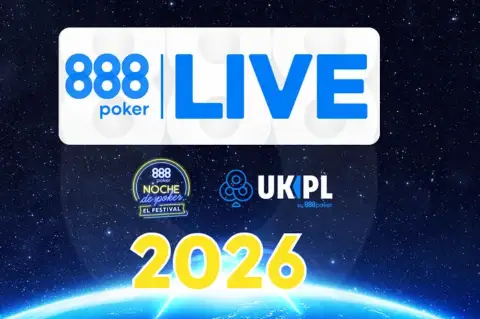Poker strategies come in all forms, for all poker variants, and can help you vastly improve your game. What’s more, joining one or more premium poker training sites can be the difference between actually turning a profit at the poker tables versus having a negative expectation. In this article, we’ll take a look at various poker strategies for intermediate poker players that will assist in making more (or losing less) money when playing in a competitive environment.

Poker Strategies: The Fundamentals
If you’re just getting into the swing of things with your poker game and want to immediately give yourself an edge over new players, then PokerCoaching has the perfect course for you.
Master The Fundamentals is specialized coursework hosted by PokerCoaching CEO and two-time World Poker Tour title winner Jonathan Little.
This free course is offered by Little and requires only a valid email address to receive. Once you’ve obtained a pass key, you’ll be able to learn everything from the basic rules of popular poker variants to more advanced concepts such as bankroll management and tweaking your play style between tournaments and cash games.
Poker Strategies: Tournament Masterclass
If your skill level has already progressed beyond the Master The Fundamentals course hosted by Jonathan Little, we highly recommend the premium Tournament Masterclass course. While this specific course is NOT for direct sale, you will be able to obtain it FREE once you’ve signed up as a premium member to PokerCoaching.com.
The Tournament Masterclass course covers specialized topics that are ideal for live and online MTT players. These concepts include a total of 180 individual lessons spread out over 30 hours, as well as Quiz modules to ensure that you’re improving your ability as you go.
How Much Does a Premium PokerCoaching Membership Cost?
As mentioned, to get the Tournament Master Class course, you will need to become a premium member to the PokerCoaching service. Premium memberships range in price between $117 and $147 per month, which is a steal when considering that many top poker coaches these days charge more than that for a single hour of one-on-one coaching.
If you opt for a 3-year membership payment plan, the course will end up costing $117 per month. If you’d like to try out the Premium PokerCoaching service for a month before committing to a longer plan, the initial cost will be $147 per month.
As a Premium member, you’ll be entitled to the Standard perks such as interactive poker quizzes and a monthly poker homework session with Jonathan Little himself. In addition to this, premium-level subscribers gain access to weekly coaching seminars, push/fold charts for short stacked play, the Crushing High Stakes Poker series with fellow coach Brock Wilson, plus the all-new How To Bink Tournaments series.
But that’s not all. Your premium PokerCoaching subscription also includes free access to the Cash Game Masterclass and Tournament Masterclass courses along with unique 30-day Tournament & Cash Game Challenges.
If you’re looking for advanced poker strategies as an intermediate player, Little’s all-inclusive premium program contains enough content to keep you improving for months or even years on end.
New subscribers who want to try out the Standard PokerCoaching service first can do so for the low price of $49 per month (or $499 for an up-front yearly subscription). All you have to do is click on one of our PokerCoaching links posted in this article.
The Poker Coaching Active Learning Module
Once you’ve tried out the free Master The Fundamentals course from Jonathan Little, you will probably want to join his Active Learning community of players, which now exceeds 120,000 poker playing clients.
This is a complete service that has around 5,700 active community members and is hosted by a hand-picked group of coaches who have had enormous success at the live and virtual felts.
The best part of this service is that it takes aspiring poker players all the way from Day 1 to the advanced level. With Active Learning, you can get real time feedback and instruction on a range of poker hands and situations.
The service would also make a perfect gift for a friend or loved one who is interested in poker and wants to improve his or her game by using tried-and-tested advanced poker strategies.
You can try this service for free as a Premium PokerCoaching member as you embark on your quest to learn how to improve at poker.
For further information before you commit to a Premium membership, be sure to check out our in-depth PokerCoaching learning paths review.
Mastering The Game: Poker Tips for Intermediate Players
Once you’ve become comfortable with the ins and outs of playing poker for real money, you may feel that you’ve reached an “intermediate” level of mastering actual poker strategies.
However, there may be a more precise measurement for acknowledging prowess in the game of poker, with a significant portion (if not all) of this measurement capable of being gauged by mathematics.
Once you’re ready to become serious about competitive poker play (or once you’ve reached a point that you want to concentrate on turning a profit long-term), some form of more focused poker training will become a necessity.
While casual, non-competitive poker players may be able to competently guide you in terms of basic concepts, like the rules of Texas Hold’em, that’s a far cry from playing poker for financial gain. If you’re fortunate and scrutinize table selection in a live setting, you may be able to routinely find poker games in which you’re a heavy favorite over the competition to participate in.
But poker strategies have become much more widespread since the turn of the century. The days of easily and routinely finding true “fish” to compete against in a real money setting are long-gone for the most part — especially in non-microstakes games.
So if you DO have an environment nearby where you enjoy a significant in-person advantage over players — enough to make a consistent full time “living” — covet that circumstance.
For everyone else, serious, robust, and constant poker study will be in order, just to have a chance at achieving or maintaining a clear profit margin over poker opponents while competing at meaningful stakes.
Jonathan Little’s Ultimate Cash Game Bundle may be one of the quickest ways for intermediate poker players to improve their game and rake in profit, in both live and online settings. Note that clicking the link in this paragraph will save you $850 on the entire cash game course package, which includes a wide range of concepts.
The option to obtain all these hours of coursework, quizzes, and training for FREE with a Premium membership to PokerCoaching.com service is one of the best values currently on the internet when it comes to mastering poker strategies.
Cash Game versus Tournament Poker Strategies
One of the key differences between cash game poker and tournament poker is the fluctuating amount of Big Blinds in No Limit formats (or Big Bets in Fixed Limit games) that a player has throughout the course of a single session.
For instance: a $5/$10 No Limit Hold’em cash game with a max cap of 100 Big Blinds (something you might see online) could very well contain one or more players who are constantly “reloading” after each hand that ends with a stack less than $1,000.
The Big Blind amount of one’s stack has an expectation of remaining relatively consistent — $1,000 or greater — throughout a long session of many hours. This, in turn, allows a player who is consistently reloading to incorporate poker strategies that are more “deep stacked than short stacked” as long as one or more opponents at the same table are likewise maintaining a minimum stack of 100 Big Blinds.
Because of this, cash game decisions can become much more in-depth (as the average Big Blind or Big Bet amount per player increases). Players have more choices, or poker strategies to choose from, when playing deep-stacked poker as opposed to short-stacked poker in general.
Your options with Pocket Aces under the gun in a deep-stacked are extremely straight forward if you only have a few Big Blinds in your stack during a cash game — as you’re going to go all-in 100% of the time. But what about Pocket Aces UTG if you and your opponents have 200+ Big Blinds in a cash game? Surely you’re not “shoving” every time (if at all) in such a circumstance.
This is where tournament poker can put a lot of inexperienced players “to the test” in a way that may be uncomfortable with (or slow in recognizing) the fluctuating Big Blind amounts of one’s own stack as well as the stacks of all opponents at a given table.
If you double-up in a tournament poker scenario, the amount of Big Blinds you now have in your stack doubles as a consequence. If an opponent doubles-through you, then that opponent will enjoy the double-up benefit while your chip stack is negatively impacted.
Understanding the nuances of how to incorporate different poker strategies depending on how large your (and your opponents’) chip stack are relative to the blinds is a concept that is fully covered in the Advanced Tournament Course offered by PokerCoaching. The course itself is taught by Little himself, by PokerGO Tour champion Brock Wilson, along with poker tournament pros Jonathan Jaffe, Matt Affleck, Justin Saliba, and Ethan “Rampage” Yau.
The Advanced Tournament Course is yet another dynamic product of instruction modules offered by PokerCoaching.com, and is a great buy once players have completed the Tournament Masterclass set.
From the Author: Poker Coursework Marketing and Non-Poker Premium Subscribers
Longtime poker pro Andre Akkari spoke at length with Cardplayer Lifestyle founder Robbie Strazynski in 2023, referring to the vast increase of poker training availability in the country of Brazil over the past decade. Brazil’s unique political situation combined with a populous hunger for strategically-inclined coursework helped build a foundation for what has become a thriving “poker school” industry in that country.
In this author’s view, there could be a similar interest boost for poker themed coursework within other countries, including the United States — derived from a growing need for proper weighting of variables by decision makers in all walks of professional life. You can find a more in-depth approach to this concept by reading our Poker and Politics article.
Marketing premium poker courses to non-poker players (and having these individuals subsequently go through the coursework) may not take them from outright “newbie” to high stakes crusher overnight, but could greatly assist decision makers who professionally operate within any number of industries.
Poker is a game of incomplete information; it provides an ideal strategic setting for enhancing a decision-maker’s acknowledgement and recognition of multiple variables that exist in almost all decision making processes.
A decision to push the gas pedal while sitting stationary in a vehicle at a stoplight can include the consideration of multiple real time variables. Accelerating after the stoplight turns green may be elementary in most circumstances, but could also be out-weighted (or overruled) if there is heavy construction work ahead along with another human being signaling you to remain stationary.
Poker can be like that, too. Even at the most basic levels of poker strategies. Creating a marketing bridge that allows non-poker players to enjoy the intricacies of poker strategy can be a win-win for those who immerse themselves in training material.














